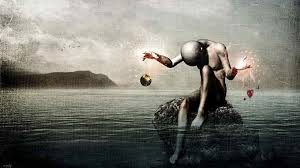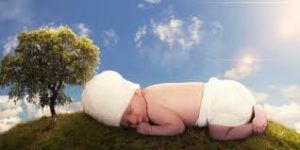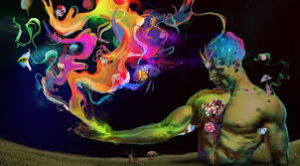If science wants to talk about the tree of life, then we have certainly got the right to see all — or at least most — of the leaves on the tree, not just those at the tips of the branches. Meaning of course, that many of those invisible leaves would represent the missing, physical, intermediate forms demanded by evolutionary theory.
Some of us keep searching for some remote spiritual inner self that we can trust and look to for help and support, but all the while we distrust the familiar self with which we have such intimate contact. We set up divisions between portions of the self that are unnecessary.
There are many schools for spiritual advancement that teach us to “get rid of the clutter of our impulses and desires,” to show aside the self that we are in search of a greater idealized version. First of, the self that we are is ever-changing and never static. There is an inner self in the terms of those definitions, but that inner self, which is the source of our present being, speaks through our impulses. They provide in-built spiritual and biological impetuses toward our most ideal development. We must trust the self that we are , now.
If we would know oneself in deepest terms, we must start with our own feelings, emotions, desires, intent and impulses. Spiritual knowledge and psychic wisdom are the natural result of a sense of self-unity.
Impulses are inherently good, both spiritually and biologically. They emerge from Framed-mind-2, from the inner self, and they are based on the great inner web-work of communication that exists among all species on our planet. Impulses also provide the natural impetus toward those patterns of behavior that serve us best, so that while certain impulses may bunch up toward physical activity, say, others, seemingly contradictory, will lead toward quiet contemplation, so that overall certain balances are maintained.
Some people are only aware of — or largely aware of — impulses toward anger, because they have inhibited those natural impulses toward love that would otherwise temper what seemed to be aggressive desires. When we begin trusting ourselves, we start by taking it for granted that to some extent at least we have not trusted oneself or our impulses in the past: We have thought that impulses were dangerous, disruptive, or even evil. So as we begin to learn self-trust, we acknowledge our impulses. We try them on for size. We see where they lead us by allowing them some freedom. We do not follow urges through that would hurt others physically, or that seem in direct contradiction to our present beliefs — but we do acknowledge them. We do try to discover their source. Behind them we will almost always find an inhibited impulse — or many of them — that motivated us to move in some ideal direction, to seek a love or understanding so idealized in our mind that it seemed impossible to achieve. We are left with the impulse to strike out.
If we examine such troublesome stimuli, we will always find that they originally rose after a long process, a process in which we were afraid to take small positive steps toward some ideal. Our own impulses naturally lead us to seek creative fulfillment, the expansion of our consciousness, psychic excursions, and the conscious knowledge and manipulation of our dreams.
No methods will work if we are afraid of our own impulses, or of the nature of our own being. Most of us understand that All That Is is within us, that God is within creation, within physical matter, and that “He” or “She” does not simply operate as some cosmic director on the outside of reality. We must understand that the spiritual self also exists within the physical self in the same fashion. The inner self is not remote, either — not divorced from our most intimate desires and affairs, but instead communicates through our own smallest gesture, through our smallest ideal.
This sense of division within the self forces us to think that there is a remote, spiritual, wise, intuitive inner self, and a bewildered, put-upon, spiritually ignorant, inferior physical self, which happens to be the one we identify with. Many of us believe, moreover, that the physical self’s very nature is evil, that its impulses, left alone, will run in direct opposition to the good of the physical world and society, and fly in the face of the deeper spiritual truths of inner reality. The inner self then becomes so idealized and so remote that by contrast the physical self seems only the more ignorant and flawed. In the face of such beliefs the ideal of psychic development, or astral travel, or spiritual knowledge, or even of sane living, seems so remote as to be impossible. We must, therefore, begin to celebrate our own beings, to look to our own impulses as being the natural connectors between the physical and the nonphysical self. Children trusting their impulses learn to walk, and trusting our impulses, we can find ourselves again.
Consciousness predates physical forms. Consciousness predates the physical universe. Consciousness predates all of its manifestations.
The impulse to be, in any terms that we understand, is without beginning or end. What we have in our physical species are the manifestations of inner species of being, or creative groupings originated by consciousness as material patterns into which consciousness then flows. In those terms, the world came into being and the species appeared in a completely different framework of activity than is imagined, and one that cannot be scientifically established — particularly within those boundaries with which science has protected itself.
The patterns for the earth and for its creatures were as real before their physical appearances, and far more real than, say, the plan for a painting that we might have in our mind. The universe always was innately objective in our terms, with its planets and creatures. The patterns for all of the species always existed without any before or after arrangement.
I am not pleased with those analogies, but sometimes they are all I can use to express issues so outside of normal channels of knowledge. It is as if, then, the earth, with all of its species, existed in complete form as a fully dimensioned cosmic underpainting, which gradually came alive all at once. Birds did not come from reptiles. They were always birds. They expressed a certain kind of consciousness that sought a certain kind of form. Physically the species appeared — all species appeared — in the same way that we might imagine all of the elements of a highly complicated dream suddenly coming alive with physical properties. Mental images — in those terms, now — existed that “in a flash of cosmic inspiration” were suddenly endowed with full physical manifestation.
To that extent, the Bible’s interpretation is correct. Life was given, was free to develop according to its characteristic conditions. The planet was prepared, and endowed with life. Consciousness built the forms, so life existed within consciousness for all eternity. There was no point in which chemicals or atoms suddenly acquired life, for they always possessed consciousness, which is life’s requirement.
In the terms that we can understand, all species that we are aware of appeared more or less at once, because the mental patterns had peaked. Their vitality was strong enough to form differentiation and cooperation within the framework of matter.
I understand that it appears that species have vanished, but again we must remember probabilities, and that those species simply “developed” along the patterns of probable earths. We are not just dealing with a one-line development of matter, but of an unimaginable creativity, in which all versions of our physical world exist, each one quite convinced of its physical nature. There are ramifications quite unspeakable, although in certain states of trance, or with the aid of educated dreaming, we might be able to glimpse the inner complications, the web-works of communications that connect our official earth with other probable ones. We choose our time and focus in physical reality again and again, and the mind holds an inner comprehension of many seemingly mysterious developments involving the species.
Even the cells are free enough of time and space to hold an intimate framework of being within the present, while being surrounded by this greater knowledge of what we think of a the earth’s past. In greater terms, the earth and all of its species are created in each moment. We wonder what gave life to the first egg or seed, or whatever, and think that an answer to that question would answer most others; for life, we say, was simply passed on from that point.
But what give life to the egg or the seed now, keeping it going, provides that energy? Imagining some great big-bang theory (to explain the creation of the universe) gives us an immense explosion of energy, that somehow turns into life but must wear out somewhere along the line — and if that were the case, life would be getting weaker all the time, but it is not. The child is as new and fresh today as a child was 5,000 years ago, and each spring is as new.
What gives life to chemicals now? That is the most proper question. All energy is not only awarized but the source of all organizations of consciousness, and all physical forms. These represent frameworks of consciousness. There was a day when the dreaming world, in our terms, suddenly awakened to full reality as far as physical materialization is concerned. The planet was visited by desire. There were ghost excursions there — mental buildings, dream civilizations which then became actualized.
There is much left unsaid.











